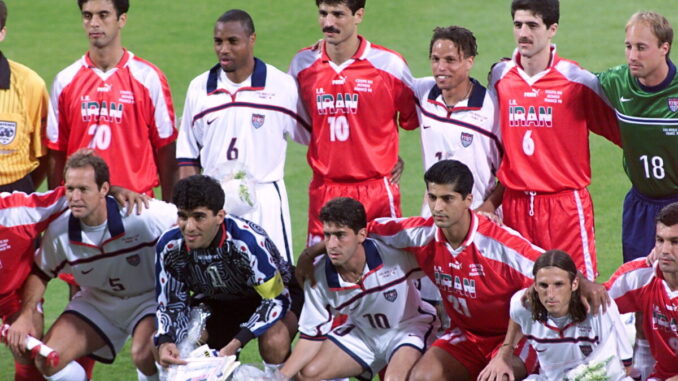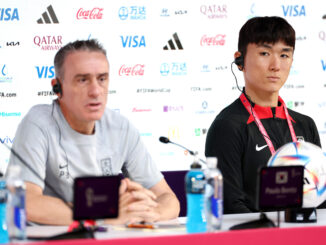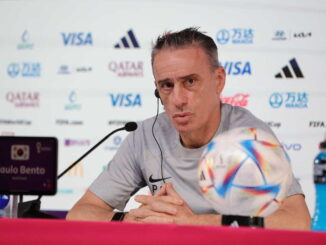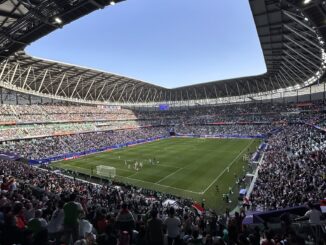

The Asian Game’s coverage of the FIFA World Cup Qatar 2022 is proudly sponsored by SMC.
Politics and sport: It is often said the pair should never mix. Yet on June 21, 1998 one of the most highly-charged fixtures in World Cup history took place when Iran and the United States met during the group phase of France 98. Michael Church was there.
For more than six months the anticipation had been building. From the moment Iran and the United States were almost implausibly placed in the same group during the World Cup draw in Marseille in December 1997 expectation of this most historic of clashes grew.
Ideological rivals since the United States-backed regime of Shah Mohammad Reza Pahlavi was overthrown by the Islamic revolution in 1979, this rare sporting encounter between nations that had spent the preceding two decades sparring with one another became a focal point of France 98.
The World Cup finals had never before seen such a clash. The propaganda war that already existed between the nations now seeped into football as the build-up to the game took on geopolitical significance amid growing rumour and speculation.
Suggestions were made in some quarters that the game should not take place; others wanted to hijack a match destined to attract global attention to further their own agendas. Iranian authorities, meanwhile, instructed their players not to shake hands with their American counterparts.
Inside the Stade de Gerland the tension was palpable. A raucous crowd, dominated by Iranian fans, turned up the volume as the world’s media gathered. Football was at risk of becoming a sideshow.
And yet it was sport that brought the two nations together and it was the players who, ultimately, were hoping to fulfill their ambitions on the field rather than being used as pawns in a much larger political game.
Both countries had lost their opening match at the finals, Iran slipping to a 1-0 defeat against Yugoslavia while the United States had been defeated by Germany. Away from all of the external pressures, both teams needed a win to put their World Cup campaign on track.
Embed from Getty Images“Before we went to France we received a lot of phone calls from people, some people who saw the US as our enemy, telling us that we can’t afford to lose that game,” says Mohammad Khakpour, who played in central defence that night for Iran.
“That itself can put you under lots of pressure because you know some angry people are waiting for that game. They’re telling you that you have to win. But these people have no clue about football, because in football there’s no must or have to. You go, you play your best and you see what’s going to happen.
“We were under lots of pressure, but when we went to France we tried to control that by not having a lot of communication outside our camp. But at the same time, there was pressure from the authorities and officials with our team who were trying to tell us this game was very important.
“We knew it was important and we were ready for it. Personally as soon as I stepped on the field it was another game for me. I wasn’t thinking about the US, I was thinking about my responsibilities and what I have to do as a football player.”
“There was a lot of pressure on us,” agrees Mehdi Mahdavikia, who went to the World Cup as Iran’s up-and-coming star. “It was expected. It was a political game, at least off the pitch and there was a lot of pressure on us. People were expecting us to get a good result.
“But in the national team and especially me, myself, I’m an athlete so we were trying to focus on the game as footballers and look at it from a sporting perspective. But still we wanted to get a good result and make the people happy.”
In the weeks leading up to the game, FIFA announced the date of the clash between the Iranians and the United States would be designated FIFA Fair Play Day in one of a growing number of attempts to diffuse tensions between the nations.
Amid a cacophonous atmosphere, the teams walked onto the pitch, the Iranians each carrying a huge bouquet of white flowers.
In contravention of a directive from the Iranian authorities, the country’s players shook hands with their American counterparts and the captains – Thomas Dooley for the United States and Iran’s Ahmedreza Abedzadeh – exchanged pleasantries before kick-off.
Players on both teams broke with convention to pose for a joint photograph, many with arms linked around one another in a highly visible display of friendship and peace before the Iranians each handed an American player their bouquet.
“It’s a good memory for me, the pre-match photo that we took together, all the Iranian and US players mixed up and taking a joint photo together,” says Mahdavikia. “It was a very good game for us, we could deliver a good game and we were happy at the end.”
Embed from Getty ImagesThe Jalal Talebi-coached Team Melli had every right to be pleased with themselves as they finally transferred the form they had shown during Asia’s qualifying tournament the previous year onto the global stage.
The Iranians had returned to the sharp end of the continental game after several decades of falling short with a team boasting the talents of Ali Daei, Karim Bagheri and Khodadad Azizi. They had reached the semi-finals of the 1996 Asian Cup and were appearing at the World Cup finals for the first time since 1978.
The footballing abilities of both teams had been lost in the frenzy leading up to the game, but when venerated Swiss referee Urs Meier blew the whistle it was Iran who took control.
And, with five minutes remaining in the first half, Team Melli went in front. Azizi’s cross from the right was met by midfielder Hamid Estili, whose looping header sailed past Kasey Keller in the United States goal to give Iran the lead.
“In the midfield, Bagheri had more freedom to join the forwards than I did,” Estili told Football Asia, the Asian Football Confederation’s official magazine, back in January 2000.
“At that moment I saw that Bagheri was still in our half. When Mehdi Mahdavikia and Javed Zarincheh were on the right flank I saw a place between Azizi and Daei. I ran into the box and headed the ball and it went in.”
While the Americans sought to pull level in the second half, Iran held on until, with six minutes remaining, Talebi’s side doubled their lead.
Mahdavikia, the youngster who had burst onto the scene at the Asian Cup and who would go on to have a top class career in the Bundesliga, raced onto a loose ball just inside the American half, driving towards goal before poking his shot beyond the opposition goalkeeper.
Embed from Getty Images“That goal was one of the biggest, most memorable and remarkable times in my life,” he says. “I will never, ever forget that moment. I remember second-by-second when I was running from the middle of the field towards the US goal and then scoring that goal.
“It had all the elements to become an important and epic goal. I was young, it was a very important match in the World Cup, it was Iran v the United States, it was the first win for Iran at the World Cup and so the whole recipe was there to make that a memorable cake for the rest of my life.”
The three points, however, were not guaranteed. Brian McBride’s effort somehow made it over the line despite the efforts of Khakpour three minutes from time but the Iranians hung on to record a historic victory.
“That win was an important win from any angle that you look at it,” says Mahdavikia. “From a sports perspective it was historical moment because we made the first win in Iranian football history at the World Cup.
“For the country it became a huge celebration, so it was also historic. And even politically it became an important moment, so we never forget that one. It was a special day. We were a good team in 1998, we had good players and a very good team so in general we were so happy.”
Khakpour, who would go on to play club football in the United States for New York/New Jersey MetroStars alongside many of those he faced that night in Lyon, feels the significance continues to resonate.
“Having that opportunity to introduce ourselves to the world after all the biased news about Iran was great, you know,” he says. “I feel after that it changed our relationship with the West. What we did in 1998 in the World Cup, especially in the 90 minutes against the United States, our politicians – for both countries – they couldn’t do that in 20 years.
“That was a great point for us, to show the whole world that we are a peaceful people even if the news is trying to introduce us differently. We were there to show we are a peaceful people, we are here to play football, we have talented kids who can play in the world after the World Cup, which they did.”
Embed from Getty ImagesThe result meant the United States were eliminated from the World Cup with one round of matches remaining while Iran went into their final game against Germany knowing victory would take the country into the knockout rounds for the first time.
But a 2-0 loss in Montpellier – with goals coming from Oliver Bierhoff and Jurgen Klinsmann – brought Iran’s World Cup campaign to an early end. For Khakpour the frustration over what might have been for him and his team mates lingers.
“It was really important because it was the first win for Iranian football at a World Cup and on top of that we won against the US,” he says. “That was making it really special.
“It gave us lots of joy and lots of pride because we were the first team in history to win a game for Iran and we were the first team in 20 years to play against the US and we won. That made us proud and happy.
“But unfortunately after the US game our officials made a mistake because for them the tournament was gone. For them the tournament was that game and they weren’t thinking about anything else. They weren’t focusing on the Germany team and the game we had.
“They thought the tournament was done after that game. That was a big mistake. That team had the potential to move to the second round and make more history.”
Listen to The Asian Game Podcast’s ‘Doha Daily‘ live from Qatar 2022




